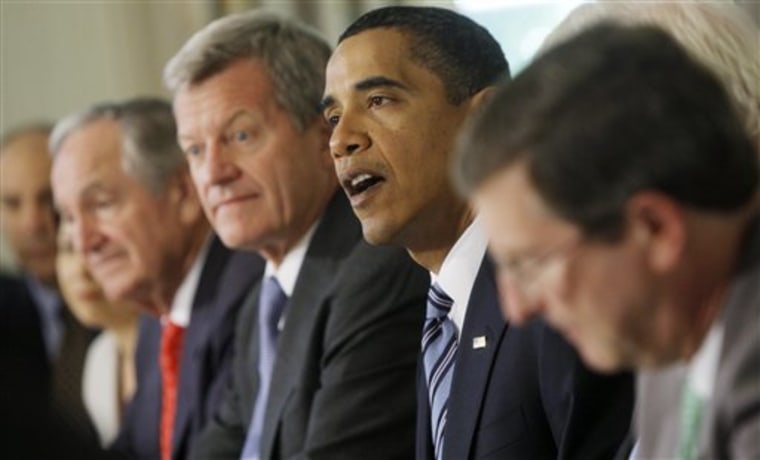President Barack Obama is leaving the door open to taxing health care benefits, something he campaigned hard against while running for president.
Senate Finance Committee Chairman Max Baucus, D-Mont., raised the issue with Obama during a private meeting Tuesday with the president and other Democratic senators and later reported the president's response: "It's on the table. It's an option."
The federal government would reap about $250 billion a year if it treated health care benefits given to employees like wages and taxed them.
Baucus and others are eyeing that money as they search for ways to pay for a costly health care overhaul that would extend coverage to 50 million Americans who are now uninsured. That could cost some $1.5 trillion over 10 years.
The president adamantly opposed health benefit taxes during the campaign, arguing they would undermine job-based coverage. But he's now indicating openness to that suggestion from Congress, even if he criticized Republican presidential rival John McCain for proposing a sweeping version of the same basic idea.
Paying for reformObama has made some suggestions of his own for paying for a health care overhaul, including cuts to Medicare and limiting tax deductions wealthy people can take, but they've run into opposition from Congress. And, they only add up to about $630 billion over 10 years.
"The president made it clear during the campaign that he has serious concerns about taxing health care benefits," White House spokesman Reid Cherlin said in a statement about Tuesday's meeting.
"He stated again his belief that health reform can't wait another year, and that while all options should be considered, those options should include the revenue proposals that he included in his budget," Cherlin said. "He made it very clear that he prefers the approach he has already outlined."
Some experts think limiting the tax exclusion for health benefits is the only way to get the necessary money to pay for a sweeping health care overhaul. But there's opposition from organized labor and from many Democrats, including House Ways and Means Chairman Charles Rangel, D-N.Y., who said recently there was "no way" he would support the approach.
Baucus wants to look at limiting — but not entirely eliminating — the tax-free status of employer-provided health benefits. Obama is leaving the details of crafting a health care bill to Congress and used Tuesday's meeting to urge senators to swift action.
"This window between now and the August recess I think is going to be the make-or-break period," Obama said before the meeting was closed to reporters. "This is the time where we've got to get this running."
Sweeping legislation
At the start of a White House meeting with senators, Obama warned that the window for overhaul legislation will close when Congress leaves for its August recess, part of his push to get lawmakers to move on a bill in the next two months. Majority Democrats in the House and the Senate want to bring the legislation to the floor by August.
White House officials argue that overhauling the health care system is key to turning around the economy.
The report by the White House Council of Economic Advisers says that health care costs — now about 18 percent of the gross domestic product — will rise to 34 percent in 30 years if left unchecked, wreaking havoc on the federal deficit, businesses and working Americans.
It says that for a typical family of four, income 10 years from now would be approximately $2,600 higher in 2009 dollars if a health care overhaul is enacted than it would be without it.
"The key contribution of the report is to show that if we do health reform well the benefits to the economy would be enormous," said Christina Romer, chairwoman of the Council of Economic Advisers.
Critics dismissed the report.
"No report or headline can take the place of a comprehensive plan — and that is what we have yet to see from the White House," said Rep. Roy Blunt, R-Mo.
